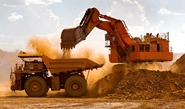Market Data

June 21, 2020
Steel Supports House Infrastructure Funding Proposal
Written by Tim Triplett
The House Transportation and Infrastructure Committee gave its approval to the INVEST in America Act on Friday, moving forward a measure that would fund much needed infrastructure work, create thousands of jobs and help the economy recover from the effects of the coronavirus pandemic. The measure is widely supported by the steel industry, as construction is the largest market for steel, though many remain skeptical that increased infrastructure spending can gain the necessary bipartisan support given the current economic and political climate.
The INVEST in America Act would provide $494 billion over five years to make infrastructure investments in surface and rail transportation and $411 billion over five years out of the Highway Trust Fund for highway, transit, safety and research programs—a 46 percent increase over current investment levels, among other funding. Click here for a complete summary of the bill.
“An efficient and robust transportation network is essential to the competitiveness of the domestic steel industry, its customers and suppliers, and American manufacturing as a whole,” said Thomas J. Gibson, president and CEO of the American Iron and Steel Institute (AISI). “We are pleased that Congress and the White House continue to take steps to pass important infrastructure legislation. We hope that today’s committee action will help facilitate achievement of the ultimate goal: passage of a robust, long-term infrastructure investment bill to provide an immediate boost to economic growth and job creation, and to make the U.S. more competitive in the decades ahead.”
AISI noted that Buy America provisions for federal infrastructure projects received bipartisan backing from the committee. “We urge the House and Senate to work together, quickly, to negotiate a consensus funding package that helps fix America’s structurally deficient roads, bridges and highways,” Gibson added.
The Steel Manufacturers Association was please by the House committee’s action as well. It urges Congress and the White House to develop a long-term infrastructure plan and to expeditiously pass a surface transportation bill that will support state DOT’s and spur steel demand. “Sufficient long-term infrastructure investment has the ability to provide an immediate boost to employment levels and to make the U.S. more competitive in the decades ahead,” said SMA President Phil Bell, noting that Wharton estimates a one-trillion-dollar infrastructure plan could create one million new jobs. “Our nation’s infrastructure should be built by Americans for Americans. We are encouraged that Congress and the administration continue to work toward a robust infrastructure program that is job centric and includes strong Buy American provisions that will help 21st Century steelmakers.”
The American Trucking Associations praised the House committee for producing “a solid piece of legislation that authorizes a significant increase in funding for our roads and bridges, as well as a broad range of policies to improve highway safety,” said ATA President and CEO Chris Spear. “We look forward to working with Congress to further improve this important bill as it continues through the process, and securing bipartisan support for an infrastructure investment package that provides real money for our roads and bridges.”
Not all industries are as supportive of the measure. The Association of American Railroads called the bill “partisan” and “deeply flawed.” Said AAR President and CEO Ian Jefferies, “The ill-conceived legislation contains numerous harmful provisions that would hamstring the rail industry for years to come and stand in the way of the industry’s ability to adapt and serve customers and the economy.” Outdated operational restrictions and capacity constraints would undermine the ongoing modernization of the rail industry, weakening the industry’s ability to serve its customers and the economy, he said.
Trade groups representing retailers such as truck stops, convenience stores and gas stations withheld their support for the bill, saying certain provisions will discourage private businesses from investing in electric vehicle charging stations and stifle the market’s transition to EVs. Investor-owned utilities would be eligible for federal grants, while private fuel retailers would have to cover the cost themselves.
The House and Senate have failed to reach a consensus on increasing highway funding many times before, so the fate of this latest measure remains uncertain. Steel buyers polled by Steel Market Update have expressed doubt that Congress will succeed in passing a transportation bill in an election year.
Editor’s note: For more analysis on this subject, see Leibowitz on Trade elsewhere in this issue.







